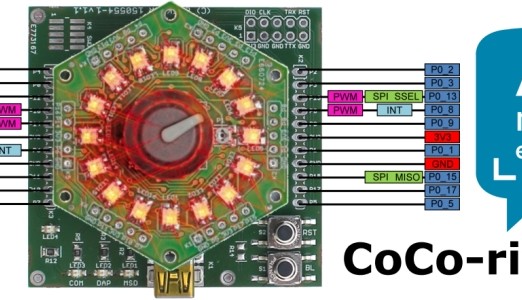Elektor CoCo-ri-Co board awarded mbed Enabled label
June 27, 2016
on
on

Over the years ARM’s mbed rapid prototyping platform has evolved into an impressive open source programming ecosystem supported by a steadily growing number of MCU and board manufacturers who propose mbed-enabled boards compatible with the online compiler. The addition of home-grown boards to mbed is of course encouraged, while at the same time tightly controlled by ARM to ensure that an mbed-enabled board is really mbed Enabled. After many weeks of studying and trying we finally obtained the mbed Enabled label for the Elektor CoCo-ri-Co! board.
The CoCo-ri-Co! board was chosen because it is based on an LPC812 ARM Cortex-M0+ MCU which makes it fulfill the first mbed-enabled requirement: it must have an ARM core. Furthermore, the LPC812 itself is already supported by mbed thanks to the work of NXP, making things much easier for us. Standing on the shoulders of giants, that sort of thing. The cool thing of mbed is of course the drag and drop MCU programming from the online compiler and for this we added a carrier board to our CoCo-ri-Co!* board on which we mounted the “mbed interface” chip that makes it all possible.
* where cocorico is the French word for the crowing of a rooster, equal to cocka-doodle-doo in English. The author, also the designer of the CoCo-ri-Co board, lives in France.
Read more on Elektor Labs…
The CoCo-ri-Co! board was chosen because it is based on an LPC812 ARM Cortex-M0+ MCU which makes it fulfill the first mbed-enabled requirement: it must have an ARM core. Furthermore, the LPC812 itself is already supported by mbed thanks to the work of NXP, making things much easier for us. Standing on the shoulders of giants, that sort of thing. The cool thing of mbed is of course the drag and drop MCU programming from the online compiler and for this we added a carrier board to our CoCo-ri-Co!* board on which we mounted the “mbed interface” chip that makes it all possible.
* where cocorico is the French word for the crowing of a rooster, equal to cocka-doodle-doo in English. The author, also the designer of the CoCo-ri-Co board, lives in France.
Read more on Elektor Labs…
Read full article
Hide full article


Discussion (0 comments)